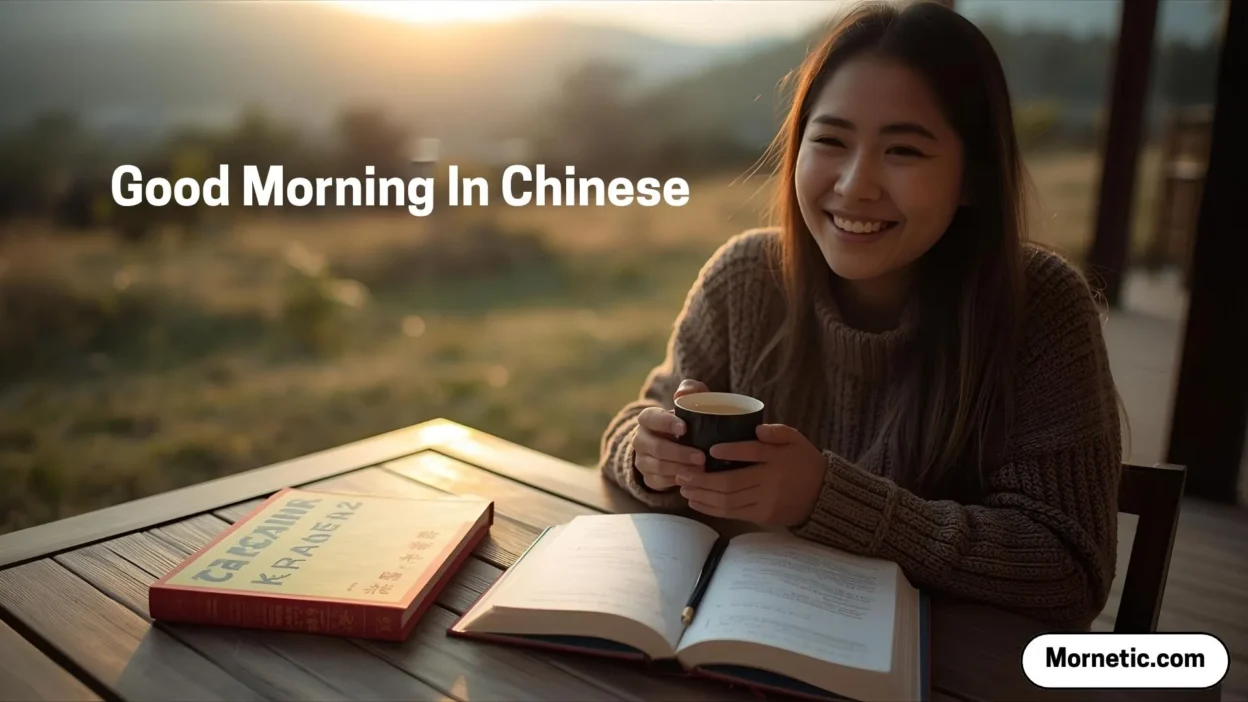Good morning! 🌞 Starting your day with a warm greeting is a universal joy. But what if you want to say it in Chinese? Learning how to say “good morning” is your first step into the beautiful world of the Chinese language and its rich culture. It shows respect and a genuine interest in connecting with people.
This guide is more than just a list of words. We will explore the most common ways to say good morning in Chinese, from formal to super casual. You will also learn greetings for the afternoon and evening, crucial pronunciation tips, and the cultural etiquette that makes your greetings truly shine. Let’s dive in and get you speaking confidently! 💪
The Importance of Greetings in Chinese Culture
In China, a greeting is not just a “hello.” It is the foundation of social interaction. It sets the tone for the entire conversation and relationship. Understanding this cultural context will make your greetings feel more natural and appreciated.
- Respect for Hierarchy: The way you greet someone often depends on their age and status. Using a more formal greeting with elders or superiors is a sign of respect.
- Building Relationships (关系 Guānxi): China is a relationship-based society. A proper greeting is the first brick in building trust and a personal connection.
- Reflecting Well-Being: Many traditional greetings are questions about a person’s state of being, like “Have you eaten?” This shows care and concern for their welfare.
- Formality vs. Familiarity: Just like in English, you wouldn’t greet your boss the same way you greet your best friend. Chinese has clear distinctions for different social settings.
Greetings in China are a beautiful blend of language, respect, and social harmony. By learning them, you are doing much more than memorizing words—you are learning to connect on a deeper level. 😊
When you use the correct Chinese greeting, you instantly show that you’ve made an effort. This small gesture can lead to warmer receptions, better service, and more meaningful conversations during your travels or business dealings.
How to Say Good Morning in Chinese: 5 Essential Phrases
Let’s get to the main event! Here are the five most common and useful ways to wish someone a good morning in Mandarin Chinese. We’ve included the characters, the Pinyin (the romanization system for pronunciation), and a clear explanation so you know exactly when to use each one.
The Standard “Good Morning”: 早上好 (zǎo shàng hǎo)
This is your go-to, standard phrase for “good morning.” It’s universally understood and perfectly appropriate for most situations.
- Breakdown: 早 (zǎo) means “early” or “morning,” 上 (shàng) means “up” or “above,” and 好 (hǎo) means “good.”
- When to Use: It’s slightly formal but works in almost all contexts—with colleagues, classmates, service staff, or people you’re meeting for the first time. It’s safe, polite, and widely used.
The Super Casual “Morning!”: 早 (zǎo)
Think of this as the Chinese equivalent of just saying “Mornin’!” It’s short, friendly, and very common in informal settings.
- Breakdown: It’s simply the first character of 早上好 (zǎo shàng hǎo), meaning “early” or “morning.”
- When to Use: Use this with close friends, family, people you see every day (like your roommate), or when you’re in a hurry. It conveys familiarity and warmth without formality.
The Polite and Formal “Good Morning”: 早安 (zǎo ān)
This phrase carries a slightly more literary and gentle tone. The character 安 (ān) means “peace,” so you are literally wishing someone a “peaceful morning.”
- Breakdown: 早 (zǎo) for “morning” and 安 (ān) for “peace.”
- When to Use: It’s very common in Taiwan and is often used in written messages, broadcasts, or when you want to sound exceptionally polite and refined. You might hear it in hotels or high-end service settings.
“Good Late Morning”: 上午好 (shàng wǔ hǎo)
This greeting is used a bit later in the morning, typically from around 9:00 AM until noon. 上午 (shàng wǔ) specifically means “forenoon” or “late morning.”
- Breakdown: 上午 (shàng wǔ) means “late morning” and 好 (hǎo) means “good.”
- When to Use: It’s more formal and less common than 早上好, but you might hear it in formal speeches, announcements, or in a business context when a meeting starts late in the morning.
The Friendly and Warm “Good Morning!”: 早上好啊 (zǎo shàng hǎo a)
Adding the particle 啊 (a) to the end of a sentence softens it and makes it sound more friendly, enthusiastic, and conversational.
- Breakdown: It’s the standard 早上好 with the additive particle 啊 (a).
- When to Use: Perfect for when you’re in a great mood and want to greet a friend or family member with extra warmth and energy. It’s like saying, “Gooood morning!” 😊
25+ Common Chinese Greeting Sentences for Daily Life
Ready to expand your vocabulary? Here is a comprehensive list of essential Chinese greetings for all times of day and situations. Copy and practice them! 📝
- Good morning. – 早上好。 (Zǎoshàng hǎo.)
- Morning! – 早! (Zǎo!)
- Good afternoon. – 下午好。 (Xiàwǔ hǎo.)
- Good evening. – 晚上好。 (Wǎnshàng hǎo.)
- Good night. – 晚安。 (Wǎn’ān.)
- Hello / Hi. – 你好。 (Nǐ hǎo.)
- Hello (to a group). – 你们好。 (Nǐmen hǎo.)
- Hello (formal). – 您好。 (Nín hǎo.)
- Have you eaten? – 吃了吗? (Chī le ma?)
- Where are you going? – 你去哪儿? (Nǐ qù nǎr?)
- Long time no see! – 好久不见! (Hǎojiǔ bùjiàn!)
- How are you? – 你好吗? (Nǐ hǎo ma?)
- How have you been recently? – 最近怎么样? (Zuìjìn zěnmeyàng?)
- What’s up? / What are you busy with? – 忙什么呢? (Máng shénme ne?)
- It’s nice to meet you. – 很高兴认识你。 (Hěn gāoxìng rènshí nǐ.)
- See you tomorrow. – 明天见。 (Míngtiān jiàn.)
- See you later. – 回头见。 (Huítóu jiàn.)
- Take care. – 保重。 (Bǎozhòng.)
- Welcome! – 欢迎! (Huānyíng!)
- Happy New Year! – 新年好! (Xīnnián hǎo!)
- Happy Birthday! – 生日快乐! (Shēngrì kuàilè!)
- Congratulations! – 恭喜! (Gōngxǐ!)
- Thank you. – 谢谢。 (Xièxiè.)
- You’re welcome. – 不客气。 (Bù kèqì.)
- Goodbye. – 再见。 (Zàijiàn.)
This list gives you a powerful toolkit for everyday conversations. Notice how many greetings are questions? This is a key part of Chinese social etiquette, showing you are engaged and care about the other person.
Many of these greetings are simple and can be mixed and matched. For example, you could greet a friend by saying “早!吃了吗?” (Zǎo! Chī le ma?) which means “Morning! Have you eaten?” It’s a natural and very Chinese way to start a conversation.
Practical Application: Using Greetings in Real Conversations
Knowing the words is one thing; using them in a conversation is another. Let’s see how these greetings flow in real-life scenarios.
Greeting a Colleague at the Office
- You: 早上好,张先生!(Zǎoshàng hǎo, Zhāng xiānsheng!) – Good morning, Mr. Zhang!
- Colleague: 早上好!吃早餐了吗?(Zǎoshàng hǎo! Chī zǎocān le ma?) – Good morning! Have you had breakfast?
- You: 吃了,谢谢。你呢?(Chī le, xièxiè. Nǐ ne?) – Yes, I have, thank you. And you?
Takeaway: This shows a polite, standard office greeting with a common follow-up question.
Meeting a Friend for Coffee
- You: 嘿,早啊!(Hēi, zǎo a!) – Hey, morning!
- Friend: 早!最近怎么样?(Zǎo! Zuìjìn zěnmeyàng?) – Morning! How have you been lately?
- You: 挺好的!忙工作。(Tǐng hǎo de! Máng gōngzuò.) – Pretty good! Busy with work.
Takeaway: Here, the greetings are casual and abbreviated, perfectly suited for a friendly, informal meet-up.
A Formal Business Meeting
- You: 您好,李经理。很高兴认识您。(Nín hǎo, Lǐ jīnglǐ. Hěn gāoxìng rènshí nín.) – Hello, Manager Li. It’s a pleasure to meet you.
- Manager: 您好,欢迎。请坐。(Nín hǎo, huānyíng. Qǐng zuò.) – Hello, welcome. Please, have a seat.
Takeaway: This scenario uses the formal “您 (Nín)” and a standard “nice to meet you” expression, demonstrating respect in a professional setting.
Conclusion:
Congratulations! You’ve just taken a huge step forward in your Chinese language journey. 🎊 You no longer just know how to say “good morning” in Chinese—you understand the subtle differences between 早上好, 早, and 早安. You’ve learned a whole suite of greetings for any time of day and social situation, and you’ve grasped the foundational importance of tones.
Remember, every expert was once a beginner. Don’t be afraid to practice these phrases out loud, even if your pronunciation isn’t perfect at first. Chinese people are consistently delighted and encouraging when foreigners make an effort to speak their language. Using these greetings will open doors, bring smiles to people’s faces, and enrich your cultural experiences. So go ahead, be brave, and say 你好 to your next conversation! 加油 (Jiāyóu)

Grace is a lifestyle writer from California who loves starting mornings with positivity. At Mornetic, she shares uplifting quotes and cheerful messages to brighten your day.




